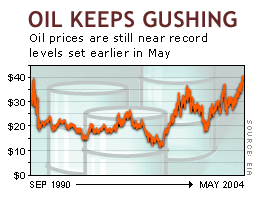NEW YORK (CNN/Money) -
After being menaced for weeks by high oil prices, U.S. stock markets breathed a sigh of relief on Monday after the weekend's news that Saudi Arabia, the world's biggest oil producer, wanted to pump more oil.
But then a funny thing happened: oil prices jumped near record highs, reflecting doubt about Saudi Arabia's ability to keep prices in check and raising the prospect that the millstone of higher prices could weigh on markets for some time to come. As that prospect sank in, stock prices lost steam.

At a meeting this weekend of the Organization of Petroleum Exporting Countries, which supplies about 40 percent of the world's total oil output, the Saudis tried to convince the other 10 members of the cartel to join them in pumping more crude, to help keep prices in check.
Crude prices have surged by more than 25 percent in the past year, with the cost of a barrel of oil rising above $41, a new record, earlier this month on the New York Mercantile Exchange. After a brief retreat at the end of last week, NYMEX light sweet crude oil once again sailed north of $41 a barrel Monday.
The price gain has raised worries about the future health of the U.S. economy, since high energy prices act as something of a tax on consumers, who typically have little choice but to buy gasoline, home heating oil and other fuels, leaving them less money to spend on other stuff.
The UBS Index of Investor Optimism for May, based on a survey of 806 small investors taken between May 1 and May 16, declined from April, driven in part by higher oil prices. Some 70 percent of the respondents said high energy prices were hurting the investment climate "a lot."
| Related stories
|

|
|
|
|
"Consumers were less pessimistic about employment and growth," UBS wrote in a note. "But they were less optimistic about the stock market and inflation, particularly as reflected in higher gasoline prices, which more than half feared were permanent."
Of course, price gains have been due in part to a strengthening global economy, which is likely robust enough to withstand the surge and avoid a recession. And oil prices, adjusted for inflation, are nowhere near as high as they've been in previous oil spikes.
Saudi ministers have said they don't want prices to get so high that they tamp out demand, and this weekend they encouraged other OPEC nations to join them in increasing oil supply.
But OPEC didn't bite, and some analysts doubt an increase in Saudi output alone will make much of a dent in the price of oil.
"We do believe there will be some kind of production increase because [OPEC doesn't] want to kill the goose that lays the golden egg, which is world economic growth," said Prabhas Panigrahi, a managing director and oil analyst at Ehrenkrantz, King & Nussbaum. "But we don't see prices dipping below $35 per barrel this year."
The Saudis say they plan to raise output by between 500,000 and 800,00 barrels per day -- something of a drop in the bucket compared with the world's daily oil demand of at least 79 million barrels.
What's more, Reuters reported on Monday that neither the Saudis nor the major oil companies have been arranging for extra transport for all this extra oil that's supposed to start flowing -- they're not yet putting their money where there mouth is.
Any relief would be welcome
Of course, even $35 per barrel would be a relief to stock markets, already jittery over higher interest rates, signs of inflation, troubling developments in Iraq, an expected slowdown in China's economy and other hobgoblins.
With everything else that's going on, many investors have felt especially queasy about the prospect of oil going much higher, which would make the expected deceleration of corporate profits and economic growth this year even worse.
"If oil could get down to $35 a barrel, that would be gratuitous," said Larry Wachtel, market analyst at Wachovia Securities. "When oil got to $41.85 [last week], the fear was that it would blow off to $50. I don't know if oil could get down to $35, but there would be a positive reaction to that."
If oil were to fall further, investors might even become willing again to engage in riskier investments, Merrill Lynch chief U.S. strategist Rich Bernstein said in a note on Monday.
After super-low interest rates encouraged investors to take bigger chances during the past year's bull market, fear of an impending Fed rate hike has driven them away from the "beta trade" -- trade in high-risk, high-return investments -- in favor of more defensive sectors lately.
"A sharp fall in energy prices might be viewed by traders as a renewed source of liquidity," Bernstein wrote, which could be a boon to high-beta sectors such as technology and consumer discretionary firms.
But the often-bearish Bernstein also suggested that relief-driven rallies in high-risk assets would be a good time to sell those assets, since higher interest rates and a slowdown in liquidity are probably inevitable anyway.

|

